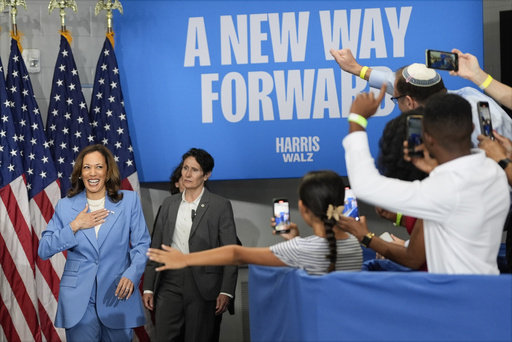
Vice President Kamala Harris delivered a speech outlining her economic proposals in Raleigh, North Carolina. She advocated for a federal ban on what she termed as price gouging on groceries, along with offering $25,000 in down payment aid for specific first-time homebuyers and tax benefits for builders of starter homes. Harris also discussed endeavors to decrease drug costs and criticized the policy stance of her Republican rival, former President Donald Trump. She highlighted specific promises and assertions during her address.
Harris raised concerns about the potential impact of Trump’s proposed tariffs, indicating they could amount to a national sales tax on imported goods, potentially costing an average family $3,900 per year. Economists predict that implementing tariffs could lead to price hikes on various products. However, Trump has suggested that the tariff revenue could be utilized to offset other taxes, potentially reducing the overall financial impact on households.
In addressing the cost of insulin and prescription drugs, Harris pledged to reduce prices for all. Highlighting the Inflation Reduction Act of 2022, which enables Medicare to negotiate drug costs directly with pharmaceutical companies, Harris aims to achieve this goal. Recent policy developments, such as deals struck by the White House to lower drug prices, provide insight into the feasibility of Harris’s promise, yet the final price consumers pay for medications can vary based on multiple factors.
Moreover, Harris proposed a federal ban on grocery price gouging, aiming to tackle high costs affecting Americans’ daily lives. While grocery prices have increased since the pandemic onset, recent trends suggest a stabilization in prices without significant price gouging. Harris’s commitment to addressing housing shortages involves the construction of 3 million new homes and rentals, in addition to offering $25,000 to first-time homebuyers for down payments. However, experts warn that subsidizing down payments may further drive demand in an already constrained housing market. Despite Harris’s plans to incentivize builders and streamline regulations, challenges such as zoning laws, material costs, and labor shortages remain unresolved.
Lastly, Harris’s proposals underscore her intent to tackle pressing economic issues affecting Americans. The intricacies and potential outcomes of these plans highlight the complexities of addressing affordability, housing shortages, and drug costs.
